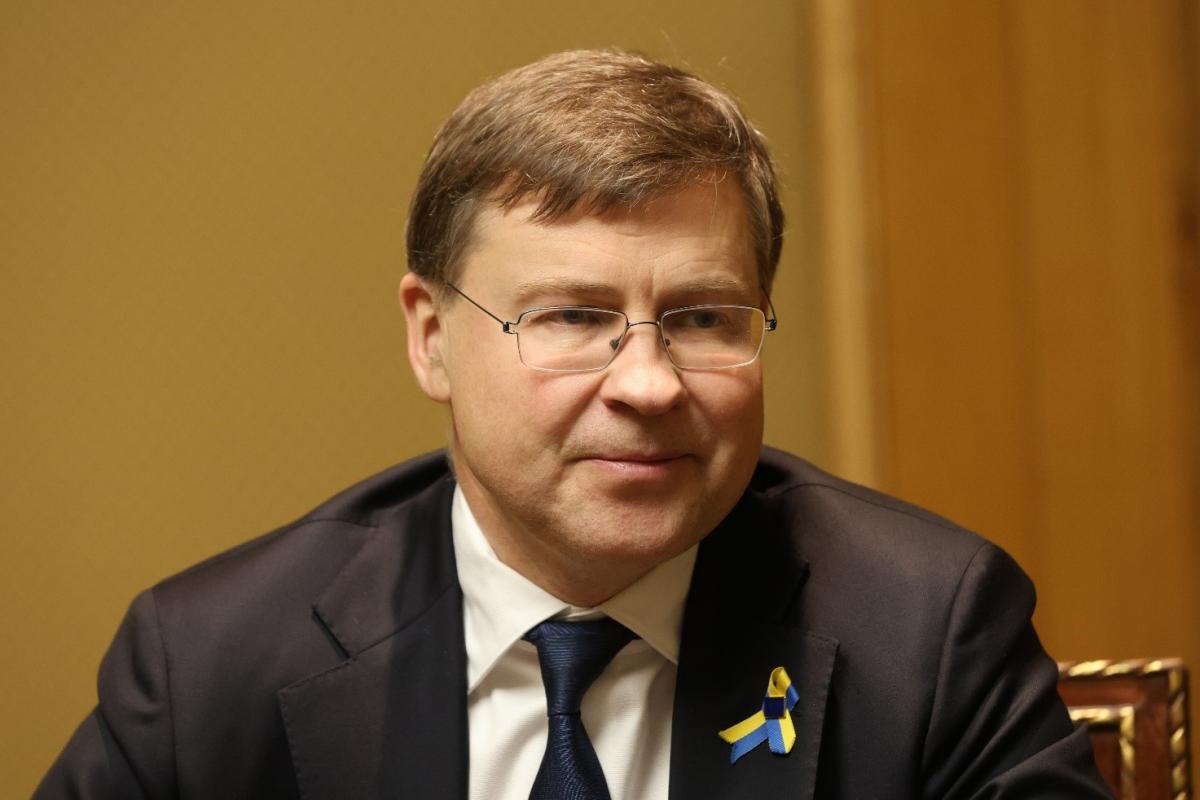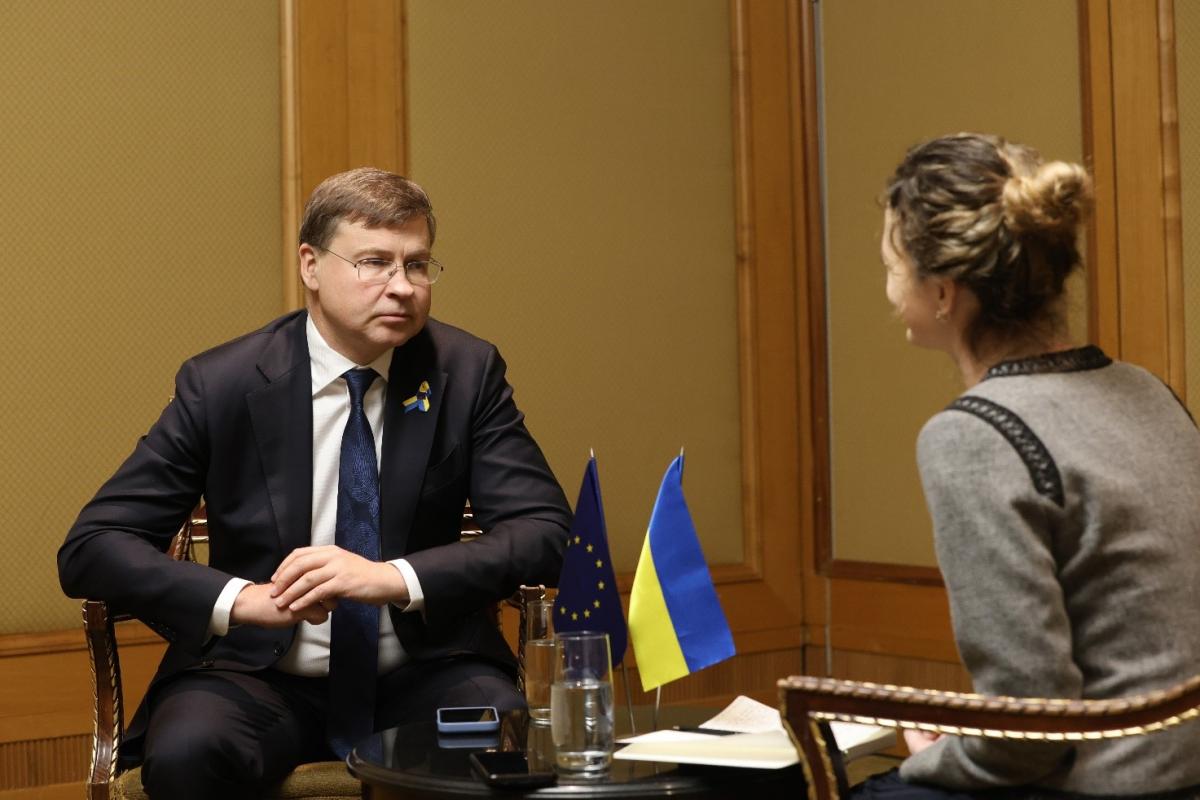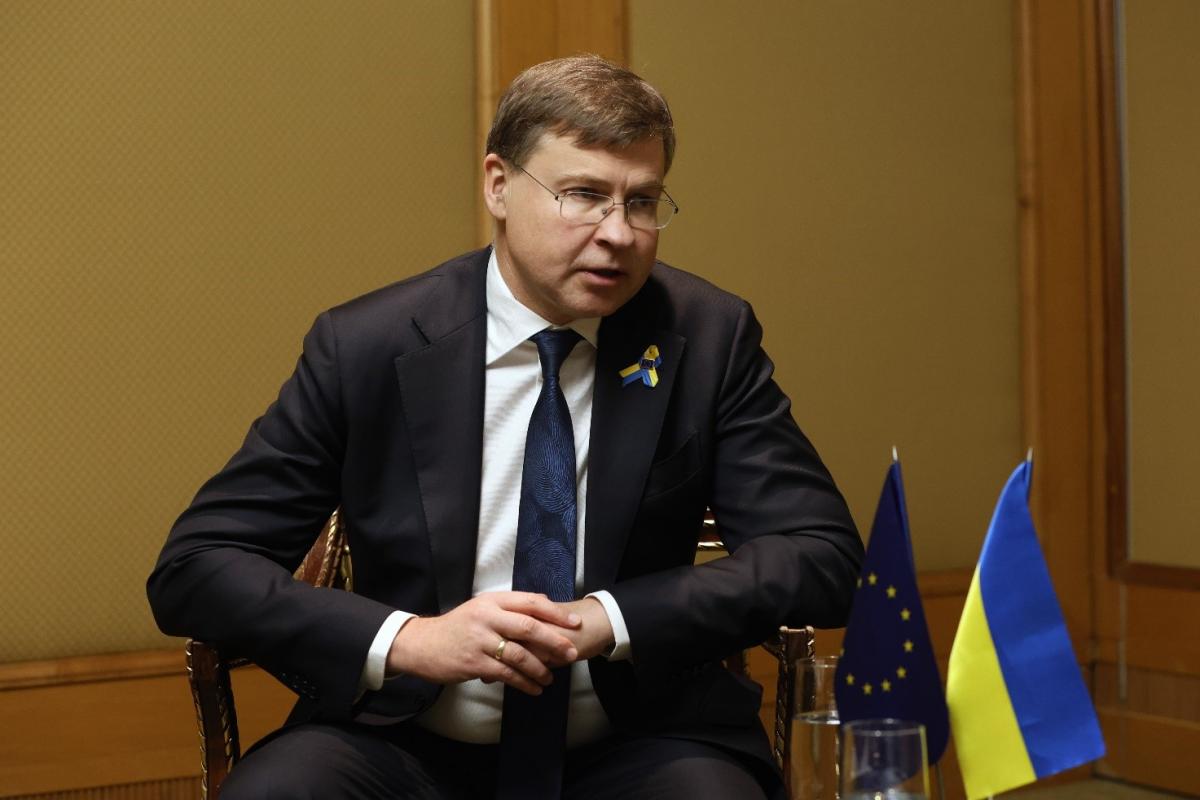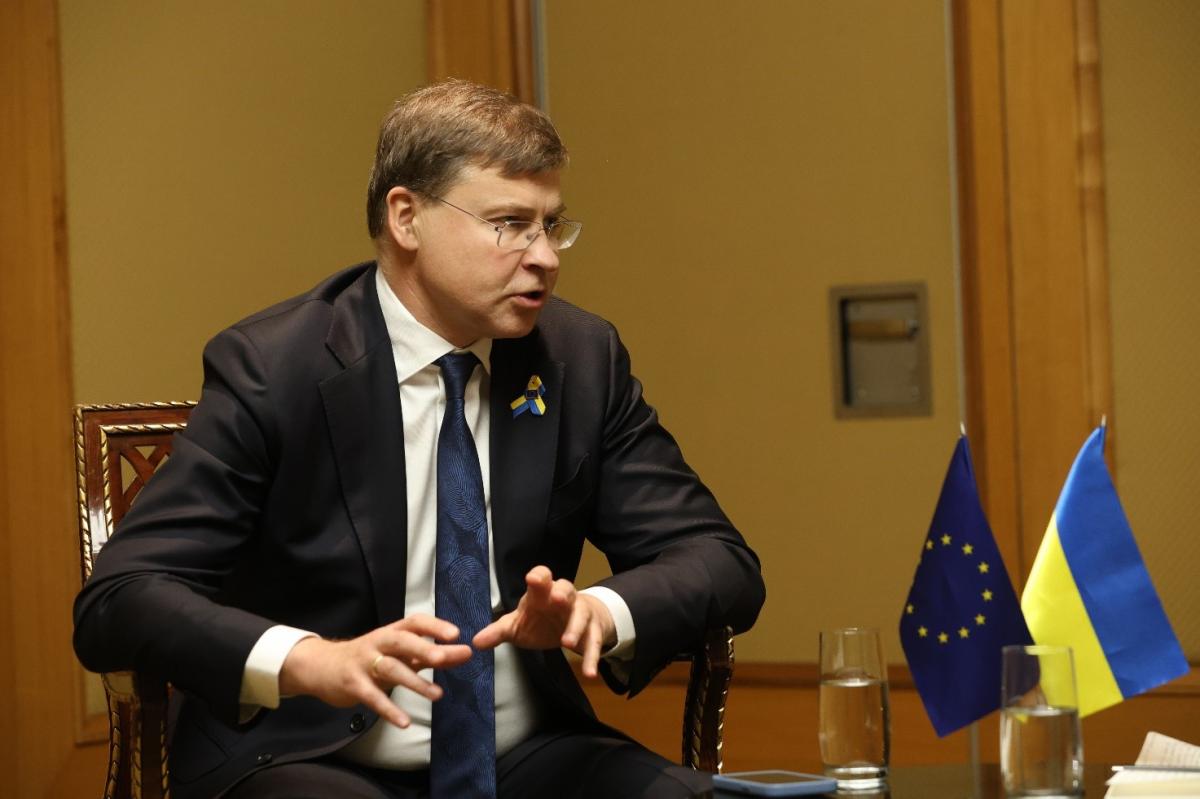The Executive Vice President of the European Commission, Valdis Dombrovskis told in an interview with UNIAN what the unblocking of the Ukrainian-Polish border depends on, how soon Russian grain will be targeted by the EU sanctions, and about priority directions in increasing European pressure on Russia.
On the background of the largest trade crisis between Ukraine and Poland, before the start of official negotiations on Ukraine’s accession to the EU, Kyiv was visited by an extremely high-ranking guest – the executive Vice President of the European Commission, Valdis Dombrovskis.
A high-ranking European official has brought good news to Kyiv. During a joint briefing with Denys Shmygal, he emphasized that Europe is standing by Ukraine in its fight against the Russian aggression and provides comprehensive support. He has told how much money our country will receive under the Ukraine Facility financing program during this month and what it the future. In addition, the European official reminded that next week the European Commission will propose a framework for Ukraine’s EU accession negotiations.
The UNIAN correspondent had a frank conversation with Mr. Dombrovskis about the prospects of unblocking the Ukrainian-Polish border, the introduction of sanctions against Russian grain, the punishment of countries and individual companies that help Russia circumvent the already imposed sanctions, the further reduction of Europe’s dependence on Russian influence and much more.
Now all EU countries have been shaken by farmers’ protests. Though the protests are caused mostly by the strict regulations of the Green Agreement, Ukraine directly suffers due to the unilateral ban on Ukrainian grain imports by few European countries and large-scale Polish strikes on the border. What measures does the European Commission take to resolve the situation?
Indeed, it is true that we are now facing farmer protests in a number of EU countries. And I’ll say that the focus of these protests varies from country to country. Like in Poland, the focus is on Ukrainian grain and Ukrainian food products. In Latvia, for example, the focus is on Russian grain. In Germany, the focus is on the additional burden from the European Green Deal and the overall administrative burden. In France, the focus is also on EU trade agreements. And so on.
At the end of the day we see that there’s quite a bit of unrest and correspondingly we are now engaged with farmers in a strategic dialogue on future of agriculture in the EU. We took some short term measures to alleviate certain aspects of administrative burdens stemming from the European Green Deal.
So all this work now is ongoing. And we’re in constant contact with both Polish and Ukrainian authorities. That was a topic of our discussions today with the Prime Minister of Ukraine, Denys Shmyhal, and with the Verkhovna Rada. Tomorrow I’ll be in Warshaw so I’ll use this occasion also to meet Polish ministers to discuss the same topic.
So there is engagement in a sense of looking to find the solutions.
What specific measures are discussed?
So one point that in a sense is causing those protests is so-called autonomous trade measures. So our unilateral trade liberalization measures which we provide to support the Ukraine’s economy. So right now we can put forward a proposal to extend those autonomous trade measures to June 2025.
But we foresee also certain additional safeguards to take care of concerns of Poland and couple of other countries and farmers in those countries. Like we foresee the same mechanism and possibility to react in situations when there is market disturbance, not only in the EU as a whole but also in one or several Member States.
We foresee automatic safeguards for three sensitive agricultural products like poultry, eggs and sugar. So in a sense that should provide additional reassurance to Poland and other neighboring countries.
Speaking of grain, I would say the situation is a bit less certain because Poland has unilaterally banned import of Ukrainian grains. And then the question is what are they protesting against? Because Ukrainian grain is already banned. And even if we were to concede to those demands, what would be the solution to ban something which is really banned. So far, I haven’t heard a clear answer on this specific issue.
But as I was saying, in any case, we continue this engagement and keep working with both Polish and Ukrainian authorities to resolve the situation.

Can you predict in what perspective it is possible to unblock the Ukrainian-Polish border?
Well, I think if one was to deal with this situation rationally, it would have been resolved by now. So it’s not something unsolvable. We see in the case of Romania (Romania basically implemented this model which also European Commission was helping to advance) an export authorization model. And we see that this model works.
It allows to avoid surges of imports in Romanian markets. So in a sense doesn’t have destabilizing effect. At the same time that allows Romania not to introduce unilateral bans. In addition, Romania is the main transit corridor in the context of EU solidarity lanes. Therefore, there are ways how to deal with this problem. It is a willingness from the governance side to deal with this.
Polish MP`s offer to impose a full embargo on all Ukrainian agricultural products, Polish farmers are protesting against Ukrainian grain, but according to Ukrainian officials` data, Ukrainian grain has not entered the domestic Polish market since last summer. However, Russia occupies 20% of the global wheat market and its exports are not blocked. Why agricultural products in Russia are not targeted by EU sanctions and they still show up on European markets?
Well, first of all, indeed, this was a decision of EU Member States in 2022 not to sanction Russian foodstuffs. Because there were disruptions in food supplies at that time, there was rapid increase in food prices. Correspondingly, not to threaten the security and affordability in food, especially in developing countries the decision was taken not to sanction Russian food.
Now what we see the situation is different. And actually, last year we saw substantial increase in imports of Russian agricultural products and Member States start to react to the situation.
Latvia was the first actually to introduce the ban on this. Now Poland is doing the same.
We are now also assessing this as a European Commission and looking for the best way to limit the presence of Russian food products in EU market.
When Russian grain and other agricultural exports can be completely banned?
It is clear that we are doing this assessment and we should be able to move forward quite rapidly.

Let’s talk about more than just food. As you know, Russia has many ways to circumvent sanctions regimes: exports (oil, gasoline etc.) as well as imports (the most important – electronic components of warfare). What measures does the European Commission intend to take for Russia to have no opportunity to bypass sanctions regimes?
By now, we have enacted 13 sanctions packages against Russia and the focus is increasingly of actually ensuring that those sanctions are implemented and they are not circumvented.
Of course, the fact remains, while EU, US and number of other countries have introduced sanctions against Russia, many other countries have not introduced sanctions. Including large countries like China, India and so on which certainly provides certain room for Russia.
So what we are doing, we are engaging with all countries of concern and we have also great dedicated sanctions envoy whose full time job is exactly to deal with this issue and also coordinating this work closely with US. We need indeed to limit this sanctions evasion and circumvention.
So one thing is engagement with relevant third countries and we see that they are taking some steps. We see Turkey taking some steps, we see Central Asian countries taking some steps.
Frankly, we had seen less engagement in this regard from China even though we had been raising those topics also always Chinese authorities. So this work is ongoing.
Then we also foresee responsibility for EU companies, which knowingly engage in these kind of sanctions circumvention schemes, and we foresee a blacklisting of third countries` companies that are engaged in sanctions convention. Blacklisting means that EU companies are prohibited to do any businesses with these companies.
This is a constant work, constant effort. When we are in discussions with the countries we have what we call high priority battlefield items which we focus first and foremost. It is a kind of microchips or other components which are found in Russian equipment in Ukrainian battlefields and which are manufactured in the West.

Then obviously, another important topic you raised is the revenue side for Russia and it’s clear that it’s exports of oil and gas which is main revenue sources for Russia. Therefore, in this context we enacted price cap for Russian oil at G7 level, actually just before that we also had a oil embargo introduced in the EU. Then we aligned price cap on natural gas. Also even though there’s no formally sanctions, but the volumes are very substantially down.
Also as you know North stream pipelines are blown up and we have in a sense unbound this strategic dependency from Russian gas supplies. Now our main gas supplier is Norway. We receive substantial amounts of LNG for example from the US. We have contracted number of countries around the world. Overall we see that it all is giving effect.
So the revenues from carbon exports had down quite considerably in Russia. Russia has to defend its currency, including by raising interest rates to 16%, which is again affecting Russia’s economy.
But also, as I mentioned, due to the fact that many other countries are not implementing sanctions, Russia is finding alternative markets, including the countries I mentioned like China and India for supply of their oil and gas.
Does the European Commission consider the possibility of introducing sanctions against countries that still help Russia? These are Armenia, Kazakhstan, Uzbekistan, Georgia, etc, in addition to the big players you have mentioned…
We are engaging with those countries. And I would say in some countries it also gives concrete results. If it is necessary, we also are blacklisting companies, which are engaged in sanctions bypassing.
At the same time, among such companies there are also European ones. As the journalists of Rzeczpospolita have reported literally today, in Lithuania there are found few companies that intentionally help Russia receive sanctioned goods…
First and foremost, what we are after are exactly the European companies and European produced goods because that is what we are sanctioning. Sanctioning in a sense of export control, export prohibition is that we are telling to our companies, producers, traders not to sell certain equipment to Russia, military, dual use, energy equipment, avionics, whatever.
There are many sectors in the latest sanctions packages, also now drone technologies and so on and so forth.
And then indeed it’s a matter of sanctions enforcement. If there are companies, which are identified which are knowingly engaged in sanctions circumvention, they can also be then persecuted in EU member states. And that’s what is happening.
Actually, we have now reached out to all EU Member States outlining this importance of sanctions enforcement and actually now following up this topic exactly in the spring.
In your opinion, what other measures can and should the European Commission take to further reduce dependence on the Russian Federation?
I will not say that there is a question anymore of Europe’s dependence on Russia in any thing because it was indeed one strategic dependence on the Russian gas supplies which is unwound.
Otherwise, I would say our economies are increasingly decoupling. But that’s not an issue for EU economy. Obviously, there were some disruptions, some supply chain problems in so to say early period of war, but European economy was able to adjust to all of this. So the question is rather what else we can do to put more pressure on Russia.
And we’ve had already a number of very comprehensive sanctions packages put in place. So as I said, focus now is on enforcement and anti-circumvention.

On the way to the EU, Ukraine may face more bans and trade conflicts from the point of view of agricultural products and metallurgy. Can you predict which categories of Ukrainian goods might cause the biggest troubles? How does Ukraine need to change its economy and export structure in order to better “fit” into the European family?
Well, first of all, what we are seeing now is I would say short term phenomenon. It’s a consequence of also war. It’s a consequence of a blockage by Russia of Black Sea corridors. So I wouldn’t say that’s something long term.
Second, I would not see any major issues outside agriculture because already now we have fully liberalized our access to EU market for all Ukrainian goods and we are not seeing any issues in any other sector.
So only sector where we see issues is actually agriculture. So I think that’s already a good indication.
This again brings me back to this topic on discussions on future of agriculture and also on discussions on future of common agricultural policy in the EU in the context of potential Ukraine’s accession.
Obviously we’ll need to to have those discussions on other sectors.
And what about metallurgy that also is the strong sector of Ukrainian economy?
Indeed before war there was a steel safeguard which was applied also with Ukraine. We are currently not applying this steel safeguard with Ukraine.
So and not seeing the kind of specific disruptions due to that. But obviously there is an issue of global steel overcapacity and something which we need to deal. And that’s the reason why steel sector for example is the most protected sector in the EU.
We have our safeguard measure, we have anti-dumping, anti-subsidy measures and so on.
But that’s I think brings us to the broader topic on global steel overcapacity.

… We are actually working to support Ukraine to integrate in a single market already. Now we have priority action plan for Ukraine’s integration into the single market. We are working on agreements on industrial conformity assessments, the so-called ACCA agreement. We are working on number of service sectors like ICT including Ukraine joining this “Rome like home” area, the financial services sector, including prospects for Ukraine to join single European payment area and so on and so forth.
So, this is work which is already ongoing and I think it’s clear that the strategic choice has been made that Ukraine’s future is in the EU.
Therefore, we are working already now on Ukraine’s integration on a single market.
Nadiia Burbela



